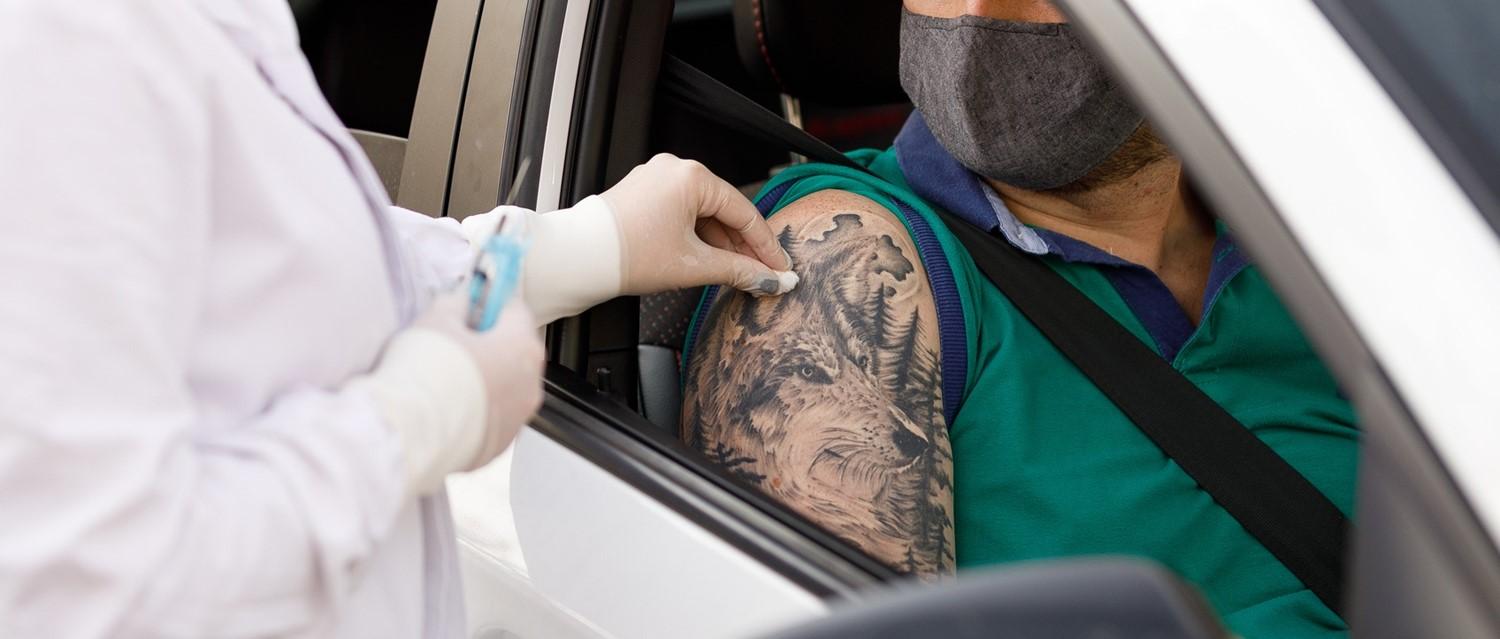MMR vaccination
Peer reviewed by Dr Krishna Vakharia, MRCGPLast updated by Dr Colin Tidy, MRCGPLast updated 14 Oct 2022
Meets Patient’s editorial guidelines
- DownloadDownload
- Share
In this series:Immunisation6-in-1 vaccinePneumococcal immunisationHPV vaccineTetanus and the tetanus vaccinePolio and polio vaccine
A dose of MMR vaccine is usually given to children aged 12-13 months. A second dose is usually given as a preschool booster. The MMR vaccine is safe and offers protection against measles, mumps and rubella, which have the potential to lead to complications that can be very serious.
In this article:
Continue reading below
What does MMR mean?
MMR stands for measles, mumps and rubella. These are three different diseases which are caused by three different viruses. The vaccines given to immunise against measles, mumps and rubella (MMR) are all combined into one injection - the MMR vaccine.
Even if you think your child has already had one of these diseases, your child should still have MMR immunisation.
Patient picks for Vaccinations

Infections
Are vaccinations going to change during the pandemic?
Flu season is fast approaching, and the NHS is bracing itself for the usual strain winter ailments place on its services each year. But with the prospect of a second wave of COVID-19 coinciding with these pressures, the government is implementing plans to try to prevent the health service from being stretched to breaking point.
by Allie Anderson

Infections
Pneumococcal immunisation
Pneumococcus can cause diseases such as pneumonia, meningitis and blood infections. Children aged under 2 years should receive the vaccine. You should consider pneumococcal immunisation if you are aged over 65 years or have certain diseases of the lung, heart, kidney, liver and nervous system.
by Dr Sarah Jarvis MBE, FRCGP
The MMR vaccine timetable
The first dose of vaccine is usually given between 12 and 13 months. It is usually given at the same time as the Hib/MenC vaccine - this stands for 'Haemophilus influenzae type b/meningitis C' and the pneumoccocal vaccine (given as separate injections).
A second dose is usually given at age 3 years and 4 months to 5 years at the same time as the DTaP/IPV injection. (DTaP stands for diphtheria (D), tetanus (T) and acellular pertussis (aP) (whooping cough). IPV stands for inactivated polio vaccine. Polio is short for poliomyelitis.)
Even if a dose of MMR is delayed for any reason, it can still be given at a later age. If necessary, MMR vaccine can be given at any age.
Older children, teenagers and young adults
If you have never previously had the MMR vaccine or only had one dose of it, you should catch up with your outstanding doses. If you have already had one dose of MMR vaccine as a young child then you will only need one further dose. It does not matter how long ago your first dose was given. If you need two doses then they can be given with a one-month gap between them.
Women of child-bearing age
Rubella can be a very serious infection for unborn babies. It can cause blindness, deafness and even death. If you are a woman of child-bearing age, even if you are not planning to have a baby, you should have two doses of the MMR vaccine before you become pregnant.
As MMR is a live vaccine, you should avoid getting pregnant for one month after the vaccine, so you should also use a reliable method of contraception during this time.
Older adults
Adults born in the UK before 1970 are likely to have had measles, mumps and rubella as a child or had single measles or rubella vaccines, which were used before MMR was introduced in 1988.
If you are unsure whether or not you have had these infections or the vaccines to protect against them, you will need two doses, one month apart. Even if you have had the vaccines before, you will not come to any harm from having extra doses.
Born or brought up abroad
If you were born or brought up abroad you may need two doses of MMR vaccine. Different countries offer different immunisations and not all use the combined MMR vaccine. You may also need other immunisations to protect you fully from other infections.
Continue reading below
MMR vaccine side-effects
Most children are perfectly well after having a dose of the MMR vaccine. Serious problems with the MMR vaccine are extremely rare. However:
Some children develop a mild raised temperature (fever) and a faint rash 7-10 days later. This should only last for 2-3 days and is of no concern.
Mild reactions such as a slight fever, a mild sore throat and joint pains sometimes occur about 1-3 weeks after the injection. These soon subside and are of no consequence.
A few children develop a mild swollen face (like a mild form of mumps) about three weeks later. Any swelling will gradually go down.
None of these reactions is infectious or serious. If necessary, you can give paracetamol or ibuprofen to ease pain and fever. Any reaction to the vaccine is much less after the second vaccine is given.
Who should not receive the MMR vaccine?
Pregnant women. Also, you should not become pregnant for one month after having a rubella (MMR) immunisation. It is safe, however, to have if you are breast-feeding.
If you are having chemotherapy or if your immune system is suppressed for other reasons.
If you are seriously ill (for example, if you have a severe infection) you should postpone the vaccine until you are better. However, if the illness is minor, the vaccine need not be delayed. The typical example is a child who gets a tummy bug or earache on the day the vaccine is due. Providing they do not have a temperature and are well in themselves, the injection can be given.
If you are allergic to the medicines neomycin or gelatin (which are part of the vaccine). There is a version of the vaccine available which does not contain gelatin if you are allergic to, or prefer not to have, gelatin.
Note: if you have an egg allergy, you may receive the vaccine safely.
Continue reading below
The MMR vaccine, autism and IBS
In the past, there has been speculation that there is a link between the MMR vaccine and autism or inflammatory bowel disease. However large studies have now all concluded that there is no evidence to link MMR immunisation to either of these conditions.
How serious are mumps, measles and rubella?
Measles
Measles is a highly infectious illness caused by the measles virus. Beginning like a bad cold, the child then develops a raised temperature (fever) and a rash. The child feels miserable and may be unwell for a week or so with a bad cough and a high temperature.
Measles is much more serious than many people think. In fact, of all childhood infections, it is the one most likely to cause the complication of inflammation of the brain (encephalitis), sometimes resulting in brain damage. It can also cause convulsions, ear infections, bronchitis and pneumonia, which can lead to long-term lung problems. Each year a number of children die from measles. In developing countries it is a major cause of childhood death. After the MMR vaccine was introduced to the UK, cases of measles and deaths from measles were drastically reduced. Unfortunately, there have been outbreaks of measles again in children in some areas of the UK over the past 10 years. This is due to some children not receiving the MMR vaccine.
Mumps
Mumps infection typically causes inflammation and swelling of the glands around the face, neck and jaw. It is usually a mild illness but complications occur in some children, such as inflammation of the pancreas (pancreatitis), inflammation of the testicles (orchitis), meningitis and inflammation of the brain (encephalitis). Mumps may cause permanent deafness in one ear. Mumps is equally dangerous for boys and girls.
Rubella (German measles)
Rubella is usually a mild illness causing a rash, sore throat and swollen glands. However, if a pregnant woman has rubella, the virus is likely to cause serious damage to the unborn child. Rubella can lead to damage to the heart, brain, hearing and sight. The baby is likely to be born with a very serious condition called the congenital rubella syndrome.
Since rubella immunisation was introduced in 1970 there has been a dramatic fall in the number of babies born with the congenital rubella syndrome. Rubella is now a very uncommon infection in the UK as a result of the vaccination programme.
Further reading and references
- Immunisation against infectious disease - the Green Book (latest edition); UK Health Security Agency.
- NHS complete routine immunisation schedule; GOV.UK
- MMR vaccine; Immunisation Scotland, NHS Scotland
- Mumps; NICE CKS, December 2023 (UK access only)
- Measles; NICE CKS, March 2018 (UK access only)
- Rubella; NICE CKS, July 2023 (UK access only).
- Di Pietrantonj C, Rivetti A, Marchione P, et al; Vaccines for measles, mumps, rubella, and varicella in children. Cochrane Database Syst Rev. 2020 Apr 20;4:CD004407. doi: 10.1002/14651858.CD004407.pub4.
- MMR for all; UK Health Security Agency. March 2022.
- Measles, mumps, rubella (MMR), use of combined vaccine instead of single vaccines; UK Health Security Agency. January 2014.
Article history
The information on this page is written and peer reviewed by qualified clinicians.
Next review due: 13 Oct 2027
14 Oct 2022 | Latest version

Are you protected against flu?
See if you are eligible for a free NHS flu jab today.

Feeling unwell?
Assess your symptoms online for free